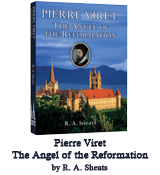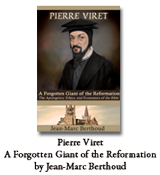Political Theory
PRINCES AND MAGISTRATES SUBJECT TO THE LAW
For prince and magistrate must be subject to the laws of the land and conform their rule to them. For they are not rulers of the law but servants thereof, as they are servants of God from whom all good laws proceed.23
AUTHORITIES GIVEN BY GOD
For as it can only be God himself who is able to give us such a perfect Law by which we are truly enabled to govern ourselves, likewise, it is only He who can provide us with Princes and Magistrates, Pastors and Ministers gifted with the capacity of applying this Law. Further, He is fully able to shape such men into adequate instruments for his service and to grant them the authority necessary for the accomplishment of the duties of their office. Thus armed they are enabled by God to maintain those over whom they rule (and of whose welfare they are accountable to God) in a spirit of due subjection.24
ROBERT LINDER ON THE PERTINENCE OF VIRET’S POLITICAL THEORY
Viret deserves a far more prominent place in the story of the Reformation than he has been accorded thus far, especially by historians in the English-speaking world. His political theory alone recommends him as one of the most important of the early leaders of historic Calvinism. It is difficult to see how future Reformation historians in general and prospective students of sixteenth-century political thought in particular will be able to ignore an individual of such significant stature and historical importance as Pierre Viret. . . . many of his political ideas appear to be of greater importance and seem to hold more significance for the development of modern democratic thought than do those of either Calvin or Beza. Viret’s concepts of democratic ecclesiastical polity, government under the law, equal justice before the law, the right of political resistance and religious toleration make him a thinker of great importance to the Calvinist movement.25
STATE GOVERNED BY GOD THROUGH THE HOLY SCRIPTURES
The Scriptures also contained statements concerning the state and, insofar as they applied to secular government, they represented God’s will for that institution. Thus the secular state was seen by Viret as a de facto creation derived directly from God himself but governed in the harmony with the rules and precepts contained in the Holy Scriptures.26
The secular state was a direct creation of God and because of this was delegated a certain amount of authority directly from God himself. However, according to Viret, the Holy Scriptures were not only described and confirmed temporal authority but also defined and limited it.27
ON THE DISTINCTION BETWEEN CHURCH AND STATE
the church has its ministers and leaders, not for meddling with those things belonging to the office of the civil magistrates, but only those things which concern the church’s ministry and discipline. For the power which the Lord Himself has provided, of which the symbol is the power of the keys, is confined within its own limits. . . . there is not one prince who has the authority to make laws for the religion and divine service of God. . . . If there is found a presumptuous prince who would obstruct the service of God, one is not obligated to obey him under the same penalty of obeying the devil.28
ON RESISTING TYRANTS
For just as He [Jesus] did not wish to overthrow the yoke of princes and lords under the title of service to God and Christian liberty, He also did not desire, under the cover of service to Kings and earthly princes, to relinquish His service to God.29
Moreover, I confess to you that is it always necessary to give honor and reverence to princes and that it is necessary to obey them in all things which relate solely to the body and to goods, and which do not effect adversely or infringe in any way upon one’s salvation or the glory of God, even when they are tyrants and maddening their subjects by great extortion and violence.30
But if there is a people who had their laws, their liberties, and their Magistrates, and who keep their duty towards those who can claim some domain over them and yet, in spite of this, some tyrant comes who, instead of watching over them, which he had promised and vowed to them, and instead of doing his duty as his office required, he wished to tyrannize those to whom he should give salvation, this is another matter. For such a people have an honest means by which they can resist the tyranny of such tyrants by their legitimate Magistrates, and can by this means avoid servitude; they can follow the counsel of St. Paul, of whom we have already spoken before, who said: “Art thou called being a servant? care not for it: but if thou mayest be made free, use it rather. [I Corinthians 7:21]31
If it happens thus, that a Prince of whom by right they be not his subjects, converted into a tyrant, and does not at all content himself with that which is his due and right pay, but desires by tyranny, force, and violence to ruin the Gospel, the religion, and the liberty of the country, and seeks to destroy, as a Turk, those whom he should protect as his children; they must then seek to defend themselves against his tyranny by the best means which God has given. There is no doubt that in such a case the Princes and Magistrates who are there must not be faint in defending their people and the country which God gave into their charge against such tyranny and violence. And if they do not, they are traitors and unfaithful to God, their country, and the people who have been committed to them.32
The Church has her ministers and conductors, not to engage in things pertaining to the office of the civil magistrates, but solely over those things which concern her ministry and her discipline. For the power which the Lord has given her (which sign is the power of the keys) is confined within these limits. Thus, if she overstep, and if her ministers usurp in any way the office of the magistrates, they abuse their office and are not true ministers but tyrants who usurp that which does not in any way belong to them.33
There is no prince who has the right to give the laws of religion and service of God. . . . If a presumptuous prince be found who desires to stop serving God, none should obey him, under pain of obeying the devil.34
VIRET’S BALANCE ON SEPARTE JURISDICTION OF CHURCH AND STATE
The pastor remembers that he is a minister of God and not of men; he faithfully discharges his offices which have been confided to him, he endeavors to obtain justice from the magistrates and the Church. That which he cannot obtain he returns to God and occupies himself solely with doing that which is his duty. He will right gladly suffer to be deposed and driven from his ministry and will expose his own life rather than act against his conscience and lose the Church in confirming impiety and tyranny.
. . . they want a liberty which is an unrestrained license . . . They want to take under their paw the poor ministers and preachers, as their valets, to make them scurry about and go under their hand as they please. If the ministers do not wish to do this, . . . they will immediately cry that such ministers are ambitious and rebels and that they wish to set aside the magistrate.
. . . matters are diverse. For this reason it is necessary that the offices pertaining to the Church and its administration and government be distinguished from those which pertain to the civil government and the republic. For otherwise there would be confusion if temporal and spiritual things were all put together.
If the complete-power of the Church is within the hands of the magistrates, they can cut it up and sew it back together as they please. They have no need to borrow the sword which they have beside them. They give and take away ministers as it seems good to them. They treat them as their valets. When they be drunk and angry, they give them leave, as the fancy takes them. And in this way the wolves will receive their fill in the Church, and the true pastors will be cast out. For the tyrants will never allow anyone to tell them the truth.35
MAGISTRATES AS NURSING FATHERS
Viret told his hearers that the office of those princes and magistrates who bore the name Christian was not to persecute the Gospel but
. . . to sustain the truth of God and to be foster-fathers (literally, ‘nursing fathers’) of his Church.
He went on to explain that what he meant here was that Christian magistrates would
. . . occupy themselves diligently with maintaining the honor and glory of our Lord Jesus Christ, pure doctrine in his Church and the true discipline.36
GOD’S LAW IS THE BASIS FOR ALL OTHER LAWS
Viret felt that all laws affecting public morals and related to spiritual values should be drawn directly from the moral law of God. However, he believed that these absolute and eternal laws of God had to be geared to the time in which people lived and the national temperament of the country to which the laws were to be applied.37
Viret made it plain that civil laws could be both good and bad. He believed that men had a certain amount of freedom in choosing the legal codes under which they live. Nevertheless, he felt that ‘good laws’ in a truly Christian state always would be based on the Ten Commandments of God found in the Holy Scriptures. According to Viret, unless human laws were built upon God’s moral law, men could not expect for them to be just and equitable. In this sense, all ‘good laws’ come from God himself for they are derived from God’s word which is the written record of his will for mankind. […]Viret’s great emphasis was upon government under civil law, and particularly under civil law derived as fully as possible within a given political context, from the moral law of God.38
Viret stressed that in every instance the true Christian should subjugate the Justinian Code and all Roman Law to the Word of God.39
THE LEGISLATION OF MORALS
Viret’s pattern of thought led him to advocate what would be called today the legislation of morals. For example, he favored the adoption of civil statues against adultery, blasphemy and idolatry, and was a proponent of regulating certain economic activities on Sunday. In addition, he linked true Christianity with the support of such laws as those controlling public corruption and the purchase of public offices, against usury, against the exploitation of the poor by the rich, and legislation fixing ceiling prices and land purchases.40
From all this it is clear that Viret’s great friendship for Calvin (his elder by only two years) in no way prevented him from, on occasion, expressing divergent theological views whilst, of course, sharing on all fundamental points of doctrine, the same reformed convictions. The Reformation thus gives us a striking example of the way basic doctrinal unity is in no way exclusive of a certain theological diversity. It is the mechanical conformism of an effeminate age which cannot stomach disagreements on secondary matters in the Church. Thus, on the question of the extent of the application of the detail of the Mosaic Law to our present situation, Viret held a significantly different position from that of Calvin. This is how Linder defines this difference:
Viret, unlike Calvin, was ready to extend openly the authority of the Bible over the state.41
Back to top of page



